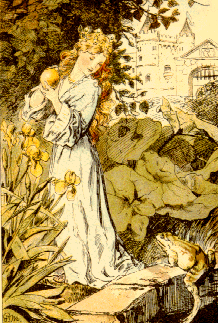I’m back!
I’m so sorry for being gone for months. As you may know, I was recently in a play, Shakespeare’s A Midsummer Night’s Dream. I’ve always loved that play and I finally got to be in it! I played the role of Helena and after weeks of memorization, a rather intense and frantic rehearsal schedule, and making my own costume in my free time, we opened to great success!
But that’s not why you’re here. You’re here to hear about fairy tales! Or you’re here because you know me or are related to me and like to support me. Either way, I’m grateful you’re here.
Now that the play is over and I have free time again, I’ve been watching a lot of different fairy tale adaptations (which is pretty normal for me, though I realize it’s sort of strange). And something about the stories caught my attention.
I was watching a version of The Frog Prince, which started in an unusual way. Instead of starting with the young princess meeting the frog (which is how the story itself starts), the tale begins with a king and queen, wishing for a child.

It struck me as a little odd, as it was an obvious addition to the story (well, obvious to someone who spends probably too much time reading and studying fairy tales).
“Well,” I told myself after a few moments of reflection. “It’s not unusual for fairy tales to be expanded upon in adaptations. And besides, that’s a normal trope to see in fairy tales.”
It was that second thought that really caught me off guard. Was wishing for a baby really all that common in fairy tales?
Well, to begin with, Sleeping Beauty is a long-wished-for child. So is Rapunzel and Snow White. And it’s not just parents who wish for children. Poor Rapunzel is an answered wish for her parents, but also the demanded price of a witch. Rumpelstiltskin also required a first-born child in exchange for his help.
All of this got me thinking. Why are children in fairy tales so often considered prizes or rewards?
Now, I don’t have a clear answer for this. But I do think it has something to do with history. These tales have been passed down for centuries and in the time when many of these stories were created, I’m assuming child mortality rates were up. So for most people (and especially those like monarchs who relied on children to inherit their titles and duties), children were precious.
I think it’s very possible that while fairy tales were written with clear morals for children to learn, there’s also a reminder for adults to cherish the younger generation.
What do you think? Why were children so important in fairy tales?
Until next time, word nerds!
Kate, I didn’t know you were in a play! What a great experience! Love reading your blog – keep those posts coming!